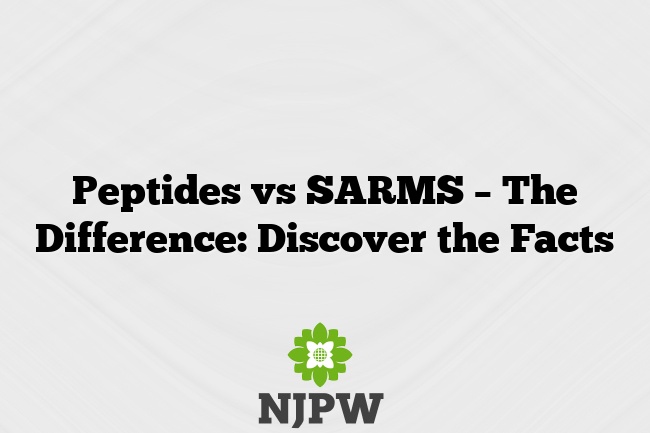When to Choose Synthetic Peptides – The Surprising Benefits

Synthetic peptides have become increasingly prevalent in the world of biopharmaceuticals, offering a wealth of advantages over their natural counterparts. As researchers and scientists continue to explore the vast potential of these innovative compounds, it’s essential to understand the key benefits that make synthetic peptides a compelling choice in various applications.
| Key Advantages of Synthetic Peptides | Description |
|---|---|
| Purity and Consistency | Synthetic peptides can be produced with a high degree of purity and consistency, ensuring reliable and reproducible results in research and clinical settings. |
| Customization | The ability to customize peptide sequences allows for the targeted design of compounds with specific functionalities, making them ideal for a wide range of applications. |
| Improved Stability | Synthetic peptides often exhibit enhanced bioavailability and stability compared to natural peptides, allowing for improved therapeutic efficacy and longer-lasting effects. |
These are just a few of the key advantages that have made synthetic peptides an increasingly attractive choice for researchers, clinicians, and pharmaceutical companies alike. By understanding the nuances of these remarkable compounds, we can unlock their full potential and explore new frontiers in the world of therapeutic peptides and peptide research.
What are Synthetic Peptides?
Synthetic peptides are short chains of amino acids that are artificially produced in a laboratory setting, rather than being derived from natural sources. These peptide compounds are designed and synthesized using advanced peptide synthesis techniques, allowing for precise control over their amino acid sequence, length, and structure.
The process of creating synthetic peptides typically involves the use of specialized equipment and chemical reagents to assemble the desired amino acid sequence. This approach offers several advantages over the extraction and purification of natural peptides, including the ability to produce larger quantities, ensure higher purity, and tailor the peptide’s properties to specific applications.
Synthetic peptides can be designed to mimic the structure and function of naturally occurring peptides, or they can be completely novel compounds with unique characteristics. This flexibility allows researchers and pharmaceutical companies to engineer peptides with enhanced stability, bioavailability, and therapeutic potential, making them valuable tools in the development of new drugs and therapeutic interventions.
Advantages of Synthetic Over Natural Peptides
The advantages of synthetic peptides over their natural counterparts are numerous and compelling. One of the primary benefits is the ability to achieve a higher degree of purity and consistency in the final product. Natural peptides extracted from biological sources can often contain impurities or variations in their amino acid sequence, which can lead to inconsistent results and potential safety concerns.
In contrast, synthetic peptides can be produced with a much higher level of purity and homogeneity, as the manufacturing process allows for precise control over the peptide structure and composition. This ensures that each batch of synthetic peptides is virtually identical, providing researchers and clinicians with a reliable and reproducible compound for their studies and applications.
Another key advantage of synthetic peptides is the ability to customize the amino acid sequence to meet specific needs. By manipulating the peptide structure, scientists can design compounds with desired biological activities, binding affinities, and pharmacokinetic properties. This level of customization is much more challenging to achieve with natural peptides, which are limited by their inherent structural characteristics.
Additionally, synthetic peptides often exhibit enhanced stability and bioavailability compared to their natural counterparts. This is due to the fact that synthetic peptides can be engineered to resist enzymatic degradation and metabolic clearance, allowing for improved therapeutic efficacy and prolonged duration of action.
Identifying Appropriate Applications
The versatility of synthetic peptides makes them applicable in a wide range of industries and research areas. One of the most prominent applications is in the development of therapeutic peptide drugs. Synthetic peptides can be designed to target specific receptors or signaling pathways within the body, allowing for the treatment of a variety of medical conditions, including metabolic disorders, cardiovascular diseases, cancer, and neurological disorders.
In the field of peptide research, synthetic peptides are invaluable tools for studying protein-protein interactions, receptor binding, and cellular signaling mechanisms. These compounds can be used as probes or antagonists to elucidate the role of specific peptides in biological processes, paving the way for the development of new therapeutic strategies.
Furthermore, synthetic peptides find applications in peptide-based vaccines, where they can be used as immunogenic components to stimulate the body’s immune response against specific pathogens or disease-causing agents. This approach offers the potential for more targeted and effective vaccine development compared to traditional methods.
In the field of peptide engineering, synthetic peptides are used to create novel biomaterials, biosensors, and nanomaterials with diverse applications in areas such as tissue engineering, drug delivery, and biosensing.
Purity and Consistency of the Compound
One of the primary advantages of synthetic peptides is the ability to produce them with a high degree of purity and consistency. This is achieved through the use of advanced peptide synthesis techniques, which allow for precise control over the amino acid sequence, length, and structure of the final compound.
During the synthesis process, each amino acid is added in a specific order, with the reactions carefully monitored and optimized to ensure the desired peptide sequence is obtained. This level of control allows for the elimination of impurities and undesired byproducts that can often be present in natural peptides extracted from biological sources.
The resulting synthetic peptides are typically characterized by a high degree of purity, with the active compound comprising the vast majority of the final product. This ensures that the biological activity and therapeutic potential of the peptide are not compromised by the presence of contaminants or structural variants.
Moreover, the manufacturing process for synthetic peptides is designed to be highly reproducible, allowing for the production of consistent batches that meet stringent quality standards. This consistency is crucial in pharmaceutical and clinical applications, where the reliability and predictability of the compound are essential for ensuring patient safety and efficacy.
The ability to produce synthetic peptides with a high level of purity and consistency is a significant advantage over natural peptides, which can be subject to variability in their amino acid composition, impurity profiles, and biological activity. This makes synthetic peptides a preferred choice for researchers, clinicians, and pharmaceutical companies seeking reliable and well-characterized compounds for their studies and therapeutic interventions.
Customizing Peptide Sequences for Specific Needs
One of the most compelling advantages of synthetic peptides is the ability to customize the amino acid sequence to meet specific needs and requirements. This level of tailored design is not easily achievable with natural peptides, which are limited by their inherent structural characteristics and the constraints of their biological origins.
By leveraging advanced peptide synthesis techniques, researchers and scientists can engineer synthetic peptides with precisely controlled length, amino acid composition, and three-dimensional structure. This customization allows for the development of compounds with targeted biological activities, enhanced stability, and improved pharmacokinetic properties.
For example, in the development of therapeutic peptide drugs, the ability to customize the peptide sequence enables the optimization of receptor binding affinity, tissue specificity, and resistance to enzymatic degradation. This can lead to the creation of more potent and effective peptide-based therapeutics with improved bioavailability and therapeutic efficacy.
Similarly, in the field of peptide research, customized synthetic peptides can be used as probes or antagonists to study specific protein-protein interactions, signaling pathways, and cellular processes. By tailoring the peptide sequence to target specific receptors or binding sites, researchers can gain valuable insights into the underlying mechanisms of biological systems.
Furthermore, the ability to customize synthetic peptides extends beyond therapeutic and research applications. In the realm of peptide engineering, these customizable compounds can be used to develop novel biomaterials, biosensors, and nanomaterials with unique functionalities and properties.
The versatility afforded by the customization of synthetic peptides is a key driver of their increasing adoption across various industries and research fields. By harnessing this capability, scientists and engineers can unlock new possibilities and push the boundaries of what is achievable with these remarkable peptide compounds.
Improved Bioavailability and Stability
Another significant advantage of synthetic peptides is their ability to exhibit improved bioavailability and stability compared to their natural counterparts. This is a crucial factor in the development of effective therapeutic peptide drugs and the success of peptide-based research.
The process of peptide synthesis allows for the incorporation of various chemical modifications and structural enhancements that can enhance the stability and pharmacokinetic properties of the peptide compound. For instance, the addition of non-natural amino acids, cyclization, or the inclusion of protecting groups can help the peptide resist enzymatic degradation and metabolic clearance within the body.
These modifications can significantly improve the bioavailability of synthetic peptides, ensuring that a greater proportion of the administered dose reaches the target site and remains active for a longer duration. This translates to enhanced therapeutic efficacy, reduced dosage requirements, and improved patient outcomes.
Furthermore, the ability to engineer synthetic peptides with enhanced stability is particularly advantageous in research applications. Stable peptide compounds are less susceptible to degradation or structural changes during storage, handling, and experimental procedures, ensuring the reliability and reproducibility of research findings.
This stability also extends to the shelf life of synthetic peptides, allowing for the development of more robust and reliable peptide-based products, such as therapeutic drugs, diagnostic tools, and research reagents.
The improved bioavailability and stability of synthetic peptides are critical factors that contribute to their growing popularity and widespread adoption in the biopharmaceutical industry, as well as in various research and development applications.
Key Benefits of Choosing Synthetic Peptides
The advantages of synthetic peptides over natural peptides are numerous and compelling, making them an increasingly attractive choice for a wide range of applications. Some of the key benefits of synthetic peptides include:
1. Purity and Consistency: Synthetic peptides can be produced with a high degree of purity and consistency, ensuring reliable and reproducible results in research and clinical settings.
2. Customization: The ability to customize the peptide sequence allows for the targeted design of compounds with specific functionalities, making them ideal for a wide range of applications.
3. Improved Stability and Bioavailability: Synthetic peptides often exhibit enhanced stability and bioavailability compared to natural peptides, allowing for improved therapeutic efficacy and longer-lasting effects.
4. Scalability and Cost-Effectiveness: The manufacturing process for synthetic peptides is generally more scalable and cost-effective compared to the extraction and purification of natural peptides, making them more accessible for large-scale applications.
5. Regulatory Compliance: Synthetic peptides can be more easily characterized, standardized, and validated, which is essential for meeting regulatory requirements in the pharmaceutical and biotechnology industries.
6. Versatility and Adaptability: The ability to customize synthetic peptides allows for their use in a wide range of applications, from therapeutic drug development to peptide-based research and engineering.
These key benefits, combined with the ongoing advancements in peptide synthesis and engineering techniques, have made synthetic peptides an increasingly attractive choice for researchers, clinicians, and pharmaceutical companies alike. As the field continues to evolve, the potential of these remarkable compounds to transform various industries and unlock new frontiers in science and medicine remains vast and exciting.
Considerations for Therapeutic Use
While synthetic peptides offer numerous advantages, there are also important considerations to keep in mind when exploring their therapeutic potential. One of the primary concerns is the potential for immunogenicity, where the body’s immune system may recognize the synthetic peptide as a foreign substance and mount an immune response.
To address this challenge, researchers often employ various strategies to minimize the immunogenic potential of synthetic peptides. This may involve the incorporation of non-natural amino acids, PEGylation, or the use of cyclic peptide structures, which can help the compound evade detection by the immune system.
Another consideration is the route of administration for therapeutic peptides. Peptides, whether synthetic or natural, often face challenges with oral bioavailability due to their susceptibility to enzymatic degradation and poor absorption in the gastrointestinal tract. As a result, alternative delivery routes, such as subcutaneous, intravenous, or intranasal administration, may be necessary to ensure the peptide reaches its intended target and achieves the desired therapeutic effect.
Additionally, the manufacturing and purification processes for synthetic peptides must be carefully monitored and validated to ensure the final product meets stringent quality and safety standards. This includes the identification and removal of impurities, the assessment of stability and shelf life, and the implementation of robust quality control measures.
Despite these considerations, the advantages of synthetic peptides, such as their customizability, improved stability, and consistent quality, make them a compelling choice for the development of therapeutic peptide drugs. By addressing the specific challenges associated with their therapeutic use, researchers and pharmaceutical companies can unlock the full potential of these remarkable compounds and bring innovative peptide-based treatments to patients in need.
Research and Development Implications
The versatility and advantages of synthetic peptides have significant implications for the field of peptide research and development. These remarkable compounds have become invaluable tools for researchers across various disciplines, from biochemistry and molecular biology to drug discovery and bioengineering.
In the realm of peptide research, synthetic peptides are widely used as probes and






